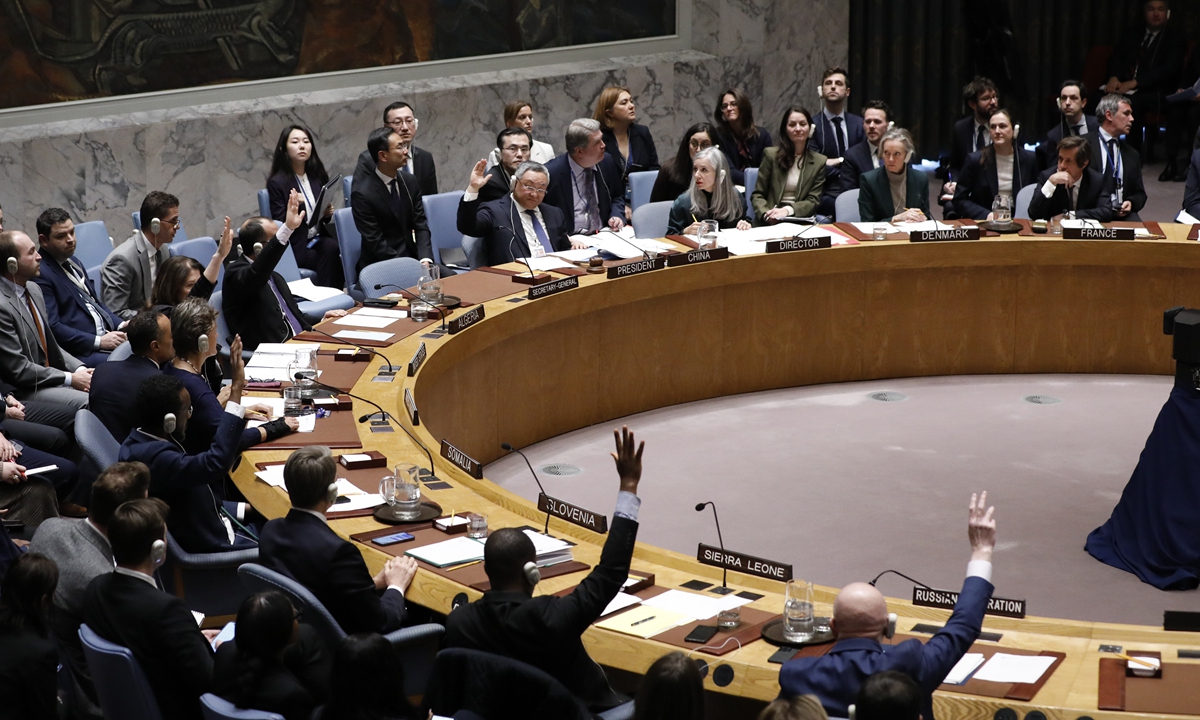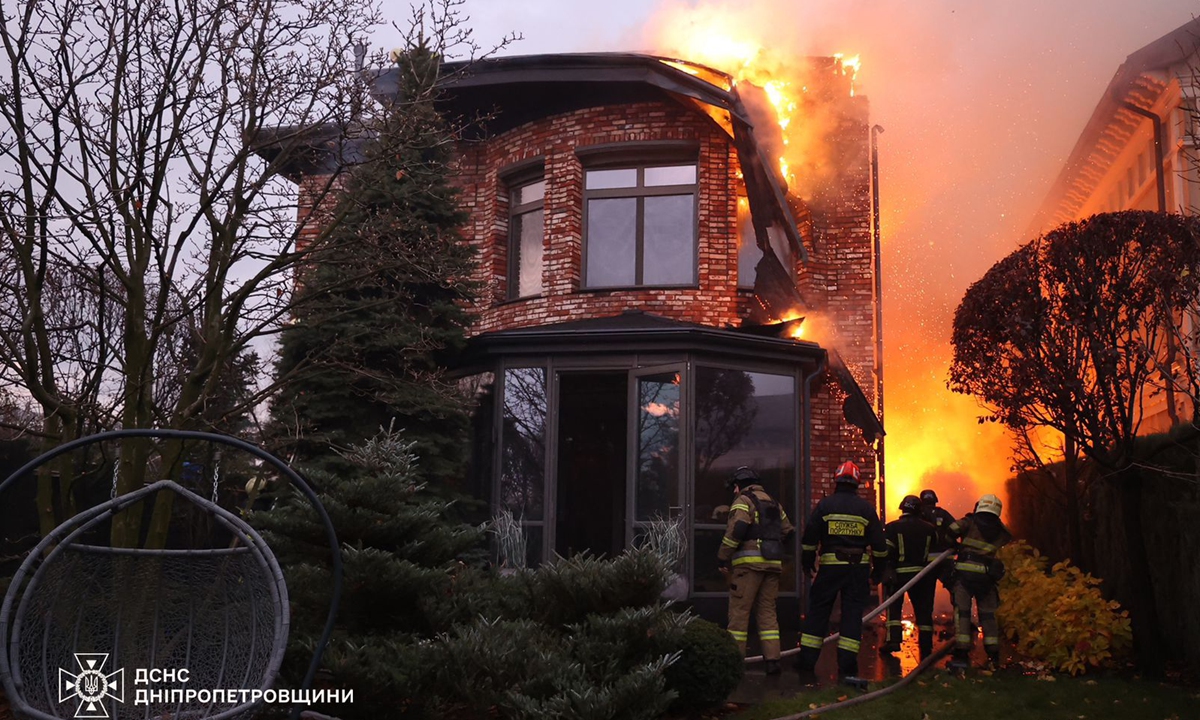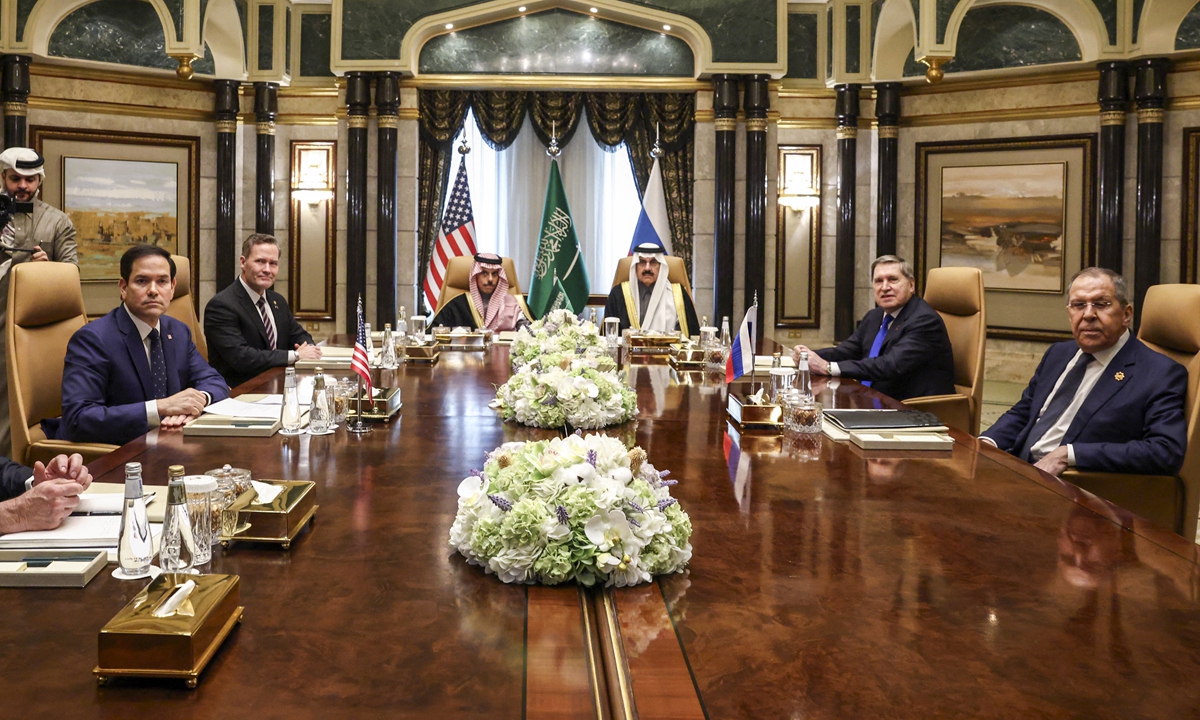US-Europe divide widens after UN resolutions on Ukraine
Shift shows Washington increasingly focuses on own interest: expert

The United Nations Security Council adopts a US-drafted resolution calling for a swift end to the Russia-Ukraine conflict in New York, US, February 24 local time, 2025. Photo: VCG
Differences between the US and Europe are deepening after the US voted against a European-backed UN resolution on Ukraine and the UN Security Council on Monday adopted a US-drafted resolution appealing for a swift end to the Russia-Ukraine conflict without blaming Russia.
Some analysts noted that amid the policy shift of the US on the Ukraine crisis, the widening transatlantic rift between the US and Europe highlights deepening divisions over how to handle the ongoing conflict.
On Monday, the US joined Russia in voting against a Europe-backed Ukrainian resolution that called out "Moscow's aggression" and demands an immediate withdrawal of Russian troops at a meeting of the UN General Assembly in New York. The US then abstained from voting on its own competing resolution after Europeans, led by France, amended it, according to the Associated Press.
Also on Monday, the US pushed for a vote on its original draft in the more powerful UN Security Council, where resolutions are legally binding. The vote in the 15-member council was 10-0 with five European countries abstaining - Britain, France, Denmark, Greece and Slovenia. China, the US and Russia voted in favor.
Fu Cong, China's permanent representative to the UN, said on Monday that China supports all efforts dedicated to peace, including the agreement reached between the US and Russia on launching peace talks. China encourages the parties concerned and other stakeholders to participate in the negotiation process, find a just and lasting solution that addresses each other's concerns, and arrive at a binding peace deal that is acceptable to all parties.
Splitting with allies
The events at the UN sparked widespread media attention, with many outlets describing it as a "major" or "stunning" policy shift from the US' previous stance. A report on the UN News website referred to the two "competing resolutions on resolving the conflict," highlighting them as a sign of strategic divides within the transatlantic alliance over the path to peace.
Three years to the day since the outbreak of the Russia-Ukraine conflict, the situation off the battlefield has evolved rapidly in recent weeks, as shown by the UN votes indicating a major dramatic geopolitical shift. The US has reversed its stance of aligning with Europe against Russia, which implies that some progress may have been made in the recent US-Russia negotiations in Saudi Arabia, Cui Heng, a scholar from the Shanghai-based China National Institute for SCO International Exchange and Judicial Cooperation, told the Global Times.
Cui noted that Russia and the US may reach at least a principled consensus on a basic framework. Although the timeline for a cease-fire and peace talks needs further discussion, the overall path to a cease-fire and peaceful resolution may have been set.
On February 18, Moscow and Washington held talks in Saudi Arabia over the war in Ukraine without European leaders present at the meeting. According to Politico, which cited Russia's state news agency RIA, representatives from both nations are set to meet again within the next two weeks. The location for this second round of talks is expected to be in a third country, though the specific venue has not yet been disclosed.
Wang Xiaoquan, an expert with the Institute of Russian, Eastern European and Central Asian Studies at the Chinese Academy of Social Sciences, also called the US' veto of the Europe-backed Ukrainian resolution "a significant shift" in the US' Russia and foreign policy, saying that Washington is increasingly focused on its own interests, and is aiming to extricate itself from the Ukraine conflict, shifting more of the burden for European security onto its allies while seeking to gradually normalize bilateral relations with Russia.
The key divide in the General Assembly vote was the stark difference in how the US and Europe view the Ukraine crisis and potential solutions. Beyond this, European nations are deeply frustrated with US President Donald Trump's foreign policy, which they see as neglecting European security and undermining the Western ideological consensus, Wang told the Global Times.
Europe's dilemma
As Monday February 24 marked the third anniversary of the outbreak of the Russia-Ukraine conflict, European leaders headed to two destinations - the US and Ukraine. CNN reported that during French President Emmanuel Macron's meeting with Trump on Monday in Washington, DC, the French leader emphasized the need for security guarantees to ensure Moscow upholds its commitments, insisting any agreement must be "checked and verified." Trump, however, avoided mentioning security guarantees during their joint press conference, instead portraying himself as a skilled negotiator seeking a deal, according to the report.
In a press conference at the White House on Monday, French President Emmanuel Macron has politely attempted to correct US President Donald Trump on the nature of European support for Ukraine, according to the CNN.
"Just so you understand, Europe is loaning the money to Ukraine. They're getting their money back," Trump began as he was preparing to make the case for a new deal to secure Ukraine's mineral revenues. That is when Macron reached over to grab Trump's arm to interject.
"No, in fact, to be frank, we paid. We paid 60 percent of the total effort. It was like the US: loans, guarantees, grants," he said, as Trump smiled ruefully, according to CNN.
Also on Monday, some EU leaders, including European Commission President Ursula von der Leyen and leaders from Baltic and Nordic nations, as well as Canadian Prime Minister Justin Trudeau, gathered in Kiev to show support, according to The Washington Post. "The shadow" of Trump loomed over the summit, as European officials quickly pledged billions of dollars in financial and military assistance, aiming to strengthen Kiev's position at the outset of US negotiations with Russia on halting the conflict, The Washington Post reported.
Cui noted that Europe is trapped in a dilemma: balancing ties with Trump and upholding political correctness by backing Ukraine, which could be two irreconcilable goals. With little hope of swaying the Trump administration, Europe has found itself having little initiative on the Ukraine in its hands.
Growing increasingly uneasy, Europe lacks strong leadership and unity to make rational decisions, Cui said, noting that since 2022, the EU has funneled huge resources into aiding Ukraine, exposing a state of strategic paralysis. This support has failed to advance Europe's core interests, Cui said.
Wang said that the Ukraine crisis has exacerbated Europe's economic struggles. Unable to independently sustain a prolonged war of attrition between Ukraine and Russia, Europe faces growing public discontent over continued aid to Ukraine and anti-Russian policies, which may lead to declining support for leaders championing these measures.
Exhausted and overstretched, Europe can offer Ukraine only limited substantive support, as verbal backing alone cannot rescue Ukraine from crisis or turn the tide of the war, Wang said.
European countries' drive for independent diplomacy and defense may strengthen, leading to more concrete actions in pursuit of strategic autonomy, the expert said.



